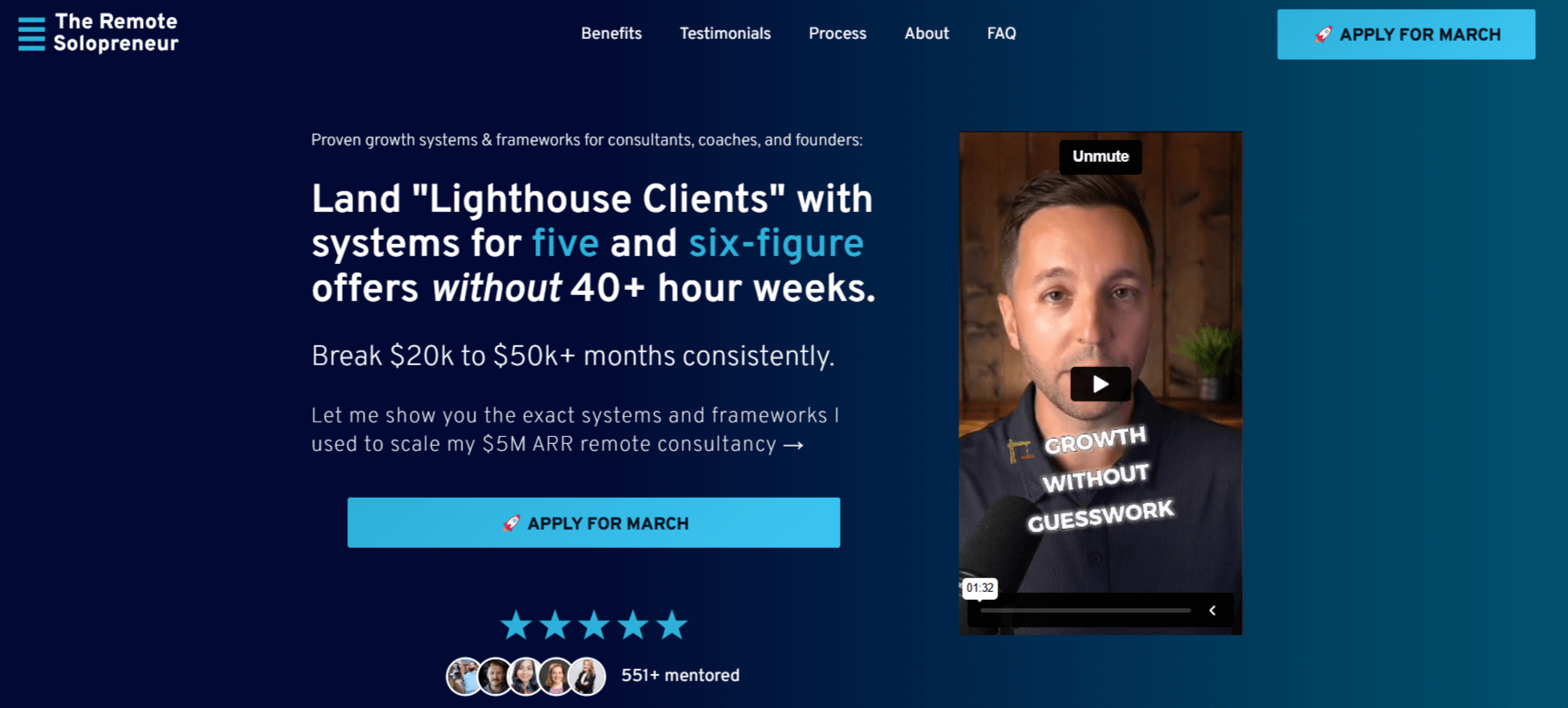🚀 TL;DR
- Peer + mentor's advice > solo advice: Group coaching gives solopreneurs a curated cohort plus frequent, high-signal feedback that 1:1 often can’t match.
- Led by active operators: The best programs are run by builders still in the arena, so guidance is specific, current, and rooted in real businesses.
- Quality over quantity: Vetted members create sharper conversations, referrals, and partnerships that compound over time.
- Leverage, not busywork: Look for systems that scale—scalable offers, referral engines, async delivery—rather than more meetings and to-dos.
Every successful solopreneur I know has invested in group coaching at some point. Not because they couldn't afford individual mentorship, but because group coaching offered something 1:1 sessions couldn't: the collective wisdom of peers facing identical challenges.
When you're building a one-person business, you need more than just expert advice. You need validation that your struggles are normal. You need to see how others solve problems you haven't even encountered yet. You need accountability from people who understand the unique pressures of solopreneurship.
In this guide, I'll show you exactly what group business coaching is, how to evaluate programs, and why it might be the smartest investment you make in your business.
What is group business coaching?
Group business coaching involves a structured learning environment for business owners. It’s a mix of learning and accountability., Experienced business leaders guide a curated group of business owners through proven frameworks and real-time problem-solving.
Think of it as the difference between reading a business book and having a skilled mentor walk you through each chapter while a room full of smart peers asks the questions you didn't know you needed answered.
What are the benefits of group business coaching?
1. Insider access to expert peers at your level
When you join the right group coaching program, you can access its entire network of successful clients.
These aren't random Facebook group members or LinkedIn connections. They're vetted entrepreneurs who've been selected for their drive, experience, and commitment to growth.
For example, in The Club (my community of expert peers), our members include seven-figure consultants, established coaches, and successful service-based founders. When you post a question about pricing strategy or client management, you get responses from people who've solved these problems at scale.
This peer access often becomes as valuable as the coaching itself. Members regularly partner on projects, refer clients to each other, and share opportunities that never make it to the public market.
2. Fast feedback from the coach
One of the biggest advantages of group coaching is the frequency of coach interaction.
I provided 1,682 answers in 2024 within The Club—offering real-time guidance, writing guides, and providing personalized feedback on member challenges. That's more touchpoints than most people get in expensive 1:1 coaching relationships.
The group format allows me to address common challenges once and have everyone benefit. When one member asks about managing it during different growth phases, the entire group learns from that conversation.
This creates exponential learning. You're learning from every challenge and breakthrough that happens in the community.
3. Proven frameworks you can apply immediately
Generic business advice doesn't work for solopreneurs. You need frameworks designed specifically for one-person businesses that want to scale without traditional hiring.
The "Growth Without Guesswork" framework I teach in The Club comes from decades of building remote businesses and helping over 551 consultants and founders grow sustainably. It's broken into four concrete stages that address the specific challenges solopreneurs face:
- Fix Your Offer
- Attract Lighthouse Clients
- Scale Your Revenue
- Async Client Delivery
Each stage includes specific tools, templates, and processes you can implement immediately. We're not talking about theory—we're talking about battle-tested systems that produce measurable results.
Members regularly tell me they recoup their entire investment within 90 days just by implementing one or two of these frameworks.
4. Focused on leverage and scalability
Most business coaching programs teach you to work harder. Group business coaching done right teaches you to work smarter.
The focus is on building systems and processes that create leverage—allowing you to serve more clients better without proportionally increasing your time investment. This might include developing scalable offers, building referral systems, or creating delivery methods that don't require your constant involvement.
Members learn how to identify and eliminate the bottlenecks that keep them trapped in day-to-day operations. The goal is to build a business that gives you more freedom and control over time.
How to choose a group business coaching program
Prioritize presence, not just a program
Too many group coaching programs are run by “coaches” who show up occasionally to deliver content but aren't actively involved in the community.
I'm the most active and present person in The Club.
I read every post, respond to questions, and participate in discussions because I'm still building businesses myself. I'm not a retired entrepreneur selling outdated strategies—I'm someone who's currently implementing these systems and adjusting them based on real market conditions.
When evaluating programs, look for coaches who are genuinely engaged with their communities. Check how frequently they respond to member questions. Look at the quality and specificity of their feedback. Ask about their involvement level before you join.
Ensure the program evolved from real business success
Verify that your potential coach or group leader has built the type of business you want to create.
I've built multiple seven-figure businesses as a solopreneur or founder and had a large exit from one of my companies. These weren't lucky accidents—they were the result of systematic approaches that I now teach to others.
Look for coaches who can show you specific examples of businesses they've built, not just clients they've helped. Ask about their current business operations. If they're only making money from coaching rather than applying their own strategies, that's a red flag.
For example, you can see my Wall of Love, where hundreds of solopreneurs have spoken about how I've helped them:

The best mentorship comes from people still in the arena, building, and dealing with the same challenges you face as a growing business owner.
Check for vetted members, not mass enrollment
Quality beats quantity every time in group coaching.
Programs that accept everyone who can pay typically devolve into generic advice and surface-level discussions. The magic happens when you're surrounded by serious, committed entrepreneurs who are operating at or slightly above your level.
Look for programs with application processes, clear criteria for membership, and evidence of member quality. Ask about the background of current members. Find out if there are any requirements for participation or contribution.
In The Club, we specifically look for people who are already generating revenue and are ready to scale systematically. This creates a peer group that can help each other rather than consume content.
Look for accountability and community over noise
Many online communities become overwhelmed with promotional posts, basic questions, and general networking chatter.
The best group coaching environments foster substantive discussions about real business challenges. Members share specific wins and struggles. The coach provides targeted feedback. The community genuinely supports each other's growth.
Before joining any program, spend time on their public content or ask for examples of member interactions. You want to see evidence of meaningful engagement, not just social media-style posting.
How does The Remote Solopreneur help solopreneurs?
Follow the "Growth Without Guesswork" 4-step path
Everything in The Club is organized around a clear progression that takes you from wherever you are now to a scalable, sustainable business model:
- Fix Your Offer: We start by ensuring your service offerings are positioned correctly, priced appropriately, and structured for scalability. Most solopreneurs leave money on the table because their offers don't reflect the value they deliver.
- Attract Lighthouse Clients: Next, we build systematic approaches for attracting and nurturing your ideal clients. This isn't about chasing everyone, but creating differentiated positioning that draws the right people to you.
- Scale Your Revenue: Then we implement systems for converting prospects into clients and increasing the value of each relationship. This includes sales processes, pricing strategies, and building a seven-figure flywheel
- Async Client Delivery: With those foundations in place, we’ll work on developing delivery methods that don't require your constant personal involvement or meetings. This creates the freedom to take on more clients and not stop your marketing and sales engines.

Each step builds on the previous one, creating momentum that compounds over time.
Modular content allows flexible progression
While there's a recommended sequence, members can jump to what matters most for their current situation.
If you're struggling with inconsistent lead generation, you can dive into the Lighthouse Client marketing systems. If your biggest challenge is pricing and positioning, you can start with the offer optimization modules.
This flexibility recognizes that every business is at a different stage and faces different immediate challenges. You get the benefit of comprehensive training without being forced through a rigid sequence that may not match your priorities.
Live workshops, hot seats, and office hours provide real-time refinement
The combination of self-paced learning and live interaction is what makes group coaching so powerful.
Our live sessions complement the online training by providing tactical feedback and clarity on specific implementations. These are working sessions where we solve real member challenges in real time:
- Hot seats allow members to get focused coaching on their specific situations.
- Office hours provide space for detailed Q&A.
- Workshops dive deep into particular topics based on current member needs.
This real-time element ensures you're not just consuming information—you're getting personalized guidance on how to apply it to your unique situation.
Option to upgrade to 1:1 mentorship for deeper support
Some challenges require more personalized attention than group settings can provide.
Members who want additional support can access individual mentorship to personalize strategy, work through complex situations, or accelerate implementation. This creates a clear path for those who need more intensive guidance without forcing everyone into expensive individual coaching.
The group coaching becomes your foundation, and 1:1 work becomes targeted support for specific challenges or opportunities.
The right group coaching program changes everything
Not every group program is created equal. Most are glorified communities with occasional content drops and minimal coach involvement.
The Club combines proven strategy, peer accountability, and hands-on mentorship rather than mass community or influencer-style programs. Members get access to frameworks that work, peers who can genuinely help, and coaching grounded in real business experience.
This model works best for proven experts ready to scale—people who are good at what they do but need systems, confidence, and leverage to grow beyond their current capacity.
When done right, group business coaching becomes a high-return learning model.
Your business is too important to leave to guesswork. But you don't have to navigate growth by yourself either.

